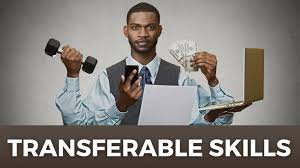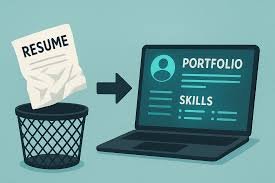
The Transferable Skill Hidden in Your Hobby: From Gaming to Project Management
The Transferable Skill Hidden in Your Hobby: From Gaming to Project Management
For years, job seekers have been told to keep their hobbies separate from their professional lives. The resume was for work, and your passions were for after hours. But in today's talent market, where soft skills, emotional intelligence, and cultural fit are just as crucial as technical prowess, this advice is outdated. Your hobbies, no matter how unconventional, are a goldmine of transferable skills—the unspoken superpowers that can differentiate you from other candidates.
Imagine interviewing for a demanding project management role. Instead of just listing "project management experience," you articulate how managing a complex, multi-player online gaming guild taught you team leadership, resource allocation, and conflict resolution. Suddenly, your "hobby" isn't a distraction; it's a compelling narrative of real-world skill application.
This blog post will explore how seemingly unrelated hobbies can equip you with highly sought-after professional attributes. We’ll show you how to identify these hidden skills and, crucially, how to articulate them on your resume and in interviews to land your dream job.
Why Your Hobbies are More Than Just Fun
Hobbies are passion projects. When you engage in something you truly love, you learn, adapt, and problem-solve without the pressure of a paycheck. This organic learning environment often hones skills in a more authentic and profound way than a formal training course ever could.
Recruiters are increasingly looking for:
-
Passion & Drive: Someone who commits to something outside of work shows initiative.
-
Soft Skills: Teamwork, communication, problem-solving, resilience—these are often developed through hobbies.
-
Authenticity: Hobbies reveal the "real" you and can help assess cultural fit.
-
Unique Perspective: An unusual hobby can make you memorable.
Unearthing Your Hidden Skills: The Hobby-to-Career Translation
Let's break down some common hobbies and the professional skills they secretly cultivate.
1. Gaming (Especially Online Multiplayer & Strategy Games)
This might be the most misunderstood hobby in professional circles, yet it's incredibly rich in transferable skills.
-
MMORPGs (e.g., World of Warcraft, Final Fantasy XIV) / Guild Leadership:
-
Project Management: Organizing raids, managing team schedules, setting objectives, resource allocation (loot distribution), coordinating diverse roles.
-
Team Leadership & Motivation: Inspiring a group towards a common goal, conflict resolution, performance management (coaching underperformers).
-
Strategic Planning: Understanding complex game mechanics, adapting to dynamic situations, long-term planning for character/guild progression.
-
Communication: Clear, concise communication under pressure, often across various channels (voice chat, text).
-
-
Strategy Games (e.g., StarCraft, Civilization, Chess):
-
Strategic Thinking: Foresight, planning multiple steps ahead, anticipating competitor moves, risk assessment.
-
Analytical Thinking: Data analysis (resource management, unit statistics), pattern recognition.
-
Problem-Solving: Adapting tactics in real-time, optimizing for efficiency.
-
Translation Example: "As a raid leader in a major online game, I consistently coordinated teams of 20+ players, managing complex objectives and optimizing resource allocation to achieve time-sensitive goals. This experience honed my ability to lead diverse groups under pressure, drive tactical execution, and foster collaborative problem-solving."
2. Creative Arts (Painting, Writing, Music, Photography, Graphic Design)
These hobbies aren't just about aesthetics; they're about communication, discipline, and iteration.
-
Writing (Blogging, Fiction, Poetry):
-
Communication: Clear, concise, persuasive writing; storytelling.
-
Attention to Detail: Editing, proofreading, maintaining consistent tone.
-
Discipline: Meeting self-imposed deadlines, perseverance through drafts.
-
-
Photography/Graphic Design:
-
Attention to Detail: Composition, lighting, editing, pixel-perfect execution.
-
Visual Communication: Conveying messages without words, understanding audience perception.
-
Brand Awareness: Developing a personal style, understanding aesthetics.
-
-
Playing a Musical Instrument:
-
Discipline & Practice: Consistent effort, delayed gratification.
-
Pattern Recognition: Understanding complex structures and improvisation.
-
Attention to Detail: Perfecting technique, listening for nuance.
-
Translation Example: "My passion for street photography has taught me to observe minute details, anticipate fleeting moments, and convey complex narratives through visual storytelling—skills I believe are directly applicable to identifying market trends and crafting compelling brand messages."
3. Endurance Sports & Fitness (Marathons, Cycling, Weightlifting)
These activities build physical endurance, but more importantly, mental fortitude.
-
Goal Setting & Execution: Planning training schedules, breaking down large goals into manageable steps, tracking progress.
-
Discipline & Perseverance: Pushing through discomfort, maintaining consistency, working towards long-term objectives.
-
Self-Motivation: Driving oneself without external supervision, managing personal energy.
-
Resilience: Overcoming setbacks (injuries, plateaus) and adapting training.
Translation Example: "Training for marathons has instilled in me a disciplined approach to setting ambitious, long-term goals and the perseverance to execute against a detailed plan, even when faced with significant challenges—qualities I apply directly to project delivery and strategic planning."
4. Volunteering & Community Organizing
These are often overlooked as "non-work" but are packed with professional experience.
-
Event Planning: Logistics, budgeting, vendor management, volunteer coordination.
-
Fundraising: Persuasion, stakeholder management, goal attainment.
-
Teamwork & Collaboration: Working effectively with diverse groups towards a common cause.
-
Problem-Solving: Adapting to unexpected issues, resourcefulness.
Translation Example: "As a volunteer coordinator for [Charity Name], I successfully organized fundraising events that consistently exceeded targets by 20%, demonstrating strong leadership, logistical planning, and stakeholder engagement skills."
How to Leverage Your Hobby on Your Resume & In Interviews
-
Be Strategic on Your Resume: Don't just list "Gaming" under hobbies. If it's highly relevant (like for project management or leadership roles), create a brief bullet point under an "Additional Skills" or "Leadership & Projects" section, translating the skills directly.
-
Bad: Hobbies: Video games
-
Good: Led a 25-person team in a high-stakes online game, coordinating complex strategies and managing resources to achieve challenging objectives under pressure.
-
-
Tell a Story in the Interview: When asked about your interests outside of work, this is your moment. Don't just name the hobby; explain what it taught you that's relevant to the job.
-
Interviewer: "What do you like to do in your free time?"
-
You: "I'm an avid baker, and it's actually taught me a tremendous amount about process optimization and quality control. For example, when developing a new recipe, I systematically test variables, meticulously document results, and iterate to achieve the perfect product—a methodology I apply to refining our marketing campaigns here."
-
-
Gauge Your Audience: Read the room. For highly traditional roles or companies, be more subtle. For innovative companies, embrace the unique perspective your hobby brings.
Your hobbies are a testament to your innate curiosity, discipline, and capacity for growth. Stop hiding them. Start recognizing the powerful professional assets they represent, and use them to tell a richer, more authentic story about your true potential.
FAQs on Hobbies and Transferable Skills
1. Should I include all my hobbies on my resume?
No. Be selective. Only include hobbies that directly demonstrate a highly valued transferable skill relevant to the job you're applying for. If it doesn't clearly show a skill, it's better to keep your resume concise. You can always bring up less relevant hobbies in an interview if the conversation naturally leads there.
2. What if my hobby seems completely irrelevant or too "niche"?
Even a very niche hobby (like competitive birdwatching or historical reenactment) can highlight skills such as meticulous research, attention to detail, long-term planning, or community engagement. The key is to think critically about the process involved in your hobby, not just the subject matter, and identify the underlying skills. Be prepared to explain the connection clearly.
3. How do I avoid sounding unprofessional when talking about a hobby like gaming?
The key is framing and professionalism. Don't talk about "pwning n00bs" or spending hours "grinding." Instead, use professional language to describe the skills involved: "strategic resource management," "complex team coordination," "real-time problem-solving," "leadership under pressure." Focus on the results and lessons learned from your hobby that are applicable to a professional setting.



